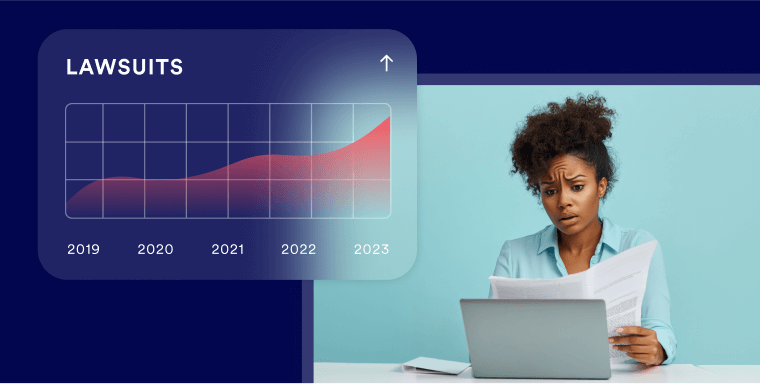The information presented within this guide is aimed at website owners seeking to learn the ropes of web accessibility and to create a more inclusive online environment for people with disabilities. Technical elements are described in layman’s terms, and, as a rule, all topics pertaining to the legalities of web accessibility are presented in as simplified a manner as possible. This blog has no legal bearing, and cannot be relied on in the case of litigation.
For online retailers, compliance with web accessibility standards isn't just about building an inclusive business culture; it’s also a legal requirement. Making your website accessible is therefore an important way to mitigate your legal risk.
As awareness surrounding digital accessibility continues to evolve, so does the potential for legal action against companies that fail to meet these standards. It’s therefore important for online retailers to understand the legal implications of an inaccessible website.
In this post, we'll explore what retailers need to know about web accessibility legislation, the potential consequences of non-compliance, and why now is the time to take action.
Web accessibility is a legal requirement for retailers
The Americans with Disabilities Act (ADA) is a landmark piece of legislation that has been protecting the rights of people with disabilities since 1990. Retail businesses in the United States must comply with this law, which applies to both physical and digital spaces.
The ADA and digital accessibility
Title III of the ADA is particularly relevant to digital accessibility. This clause specifically mandates that places of public accommodation, such as retail stores, must be accessible to people with disabilities. Traditionally, this requirement has been associated with physical spaces, such as ensuring wheelchair access or providing sign language interpreters. However, as our world has increasingly moved online, courts have agreed that the ADA Title III includes digital spaces too, such as websites and online stores.
Since 2018, the Department of Justice (DOJ) has repeatedly emphasized that websites are covered by the ADA. This means that retailers are legally required to ensure their online platforms are accessible to all users, including those with disabilities. Although the ADA does not explicitly outline web accessibility guidelines, many U.S. courts have adopted the DOJ's stance, effectively making web accessibility a legal obligation for retailers.
Accessibility legislation around the world
The ADA is just one of many pieces of legislation that regulate digital accessibility. Countries across the world are implementing laws to ensure that people with disabilities have equal access to online services and information.
European accessibility legislation
In Europe, the push for digital accessibility is gaining significant momentum. Starting in 2025, several key laws will take effect, most notably the European Accessibility Act (EAA). This act mandates that digital services and products across the European Union must be accessible to individuals with disabilities. Additionally, the Web Accessibility Directive places specific obligations on public sector organizations, requiring them to ensure that their websites and mobile apps are fully accessible to all users.
Accessibility legislation in the UK
In the United Kingdom, the Equality Act 2010 prohibits discrimination based on disability and mandates that digital services, such as websites and mobile apps, be accessible. The Public Sector Bodies (Websites and Mobile Applications) Accessibility Regulations 2018 also imposes stricter accessibility standards on public sector organizations, ensuring they meet the necessary requirements for digital inclusion.
Canadian accessibility laws
Canada is at the forefront of promoting digital accessibility through comprehensive federal and provincial legislation. The Accessible Canada Act (ACA) sets the standard at the federal level, requiring government agencies, Crown corporations, and private sector organizations under federal jurisdiction to make their services and workplaces accessible.
Ontario's Accessibility for Ontarians with Disabilities Act (AODA) establishes detailed accessibility standards that apply to both public and private sector organizations, with specific requirements for accessible websites and digital content.
If you'd like to learn more about web accessibility and its impact on Canadian retailers, press here.
The WCAG: the standard for accessibility compliance
The Web Content Accessibility Guidelines (WCAG) is the go-to standard for web accessibility worldwide. It’s widely recognized as the benchmark for creating accessible online content.
Online retailers looking for a guide as they strive to make their websites accessible can look to the WCAG.
Developed by the World Wide Web Consortium, the WCAG outlines key principles to ensure your website is accessible to everyone. These principles are captured by the acronym POUR:
- Perceivable: Information must be presented in ways that all users can perceive.
- Operable: All users should be able to navigate and interact with the site.
- Understandable: The content and interface should be clear and easy to understand.
- Robust: Content should be compatible with various technologies, including assistive tools.
The best way to make sure that your website complies with various accessibility legislation is to conform with the WCAG 2.1 at the AA level.
We recommend you check out our comprehensive ADA website compliance checklist that provides you with important action items on your road to WCAG 2.1 Level AA conformance. You can access the checklist by pressing here.
Demand letters and lawsuits: What to expect when you are found to be non-compliant with the ADA

For retailers, failing to comply with the ADA can result in serious legal consequences. One of the most common forms of legal action taken against businesses for web accessibility issues is the ADA demand letter.
These letters are sent with the aim of informing business owners that their websites aren’t accessible, and they offer them the opportunity to fix it. Failure to do so, however, can result in a full blown lawsuit.
Understanding ADA demand letters
Receiving an ADA demand letter can be a daunting experience for any retailer. These letters often cite specific accessibility violations, such as a lack of alt text on meaningful images or insufficient keyboard navigation, and demand that these issues be resolved promptly.
Ignoring a demand letter can lead to a lawsuit, which can be both costly and damaging to a retailer's reputation.
Even if the lawsuit does not result in a significant penalty, the negative publicity that often accompanies such legal action can have long-lasting effects on a brand's reputation.
Accessibility-related lawsuits
In the United States, web accessibility-related lawsuits are currently on the rise, with a 13% increase in 2023. The trend has continued in the first half of 2024, with the total number of lawsuits expected to pass 4,000 by the end of the year.
This is only the tip of the iceberg, since around 97% of cases are settled before going to trial.
The retail industry: One of the most heavily impacted by ADA compliance lawsuits

In recent years, the retail industry has become one of the industries most impacted by ADA compliance lawsuits related to web accessibility. As more consumers turn to online shopping, the need for accessible digital experiences has grown. Unfortunately, many retailers have struggled to keep pace with these demands, leading to a sharp increase in legal action.
The growing wave of lawsuits
Over the past five years, 81% of the top 500 U.S. e-commerce retailers have faced lawsuits for website accessibility issues under the ADA. 15% of these companies have been sued since the beginning of 2024 alone. This trend shows no sign of slowing down, as advocacy groups and law firms continue to scrutinize the accessibility of online retail platforms.
The financial impact of these lawsuits can be significant. In addition to legal fees, businesses may be required to pay settlements or penalties. The total costs involved in such legal action can range from $5,000 to $25,000 per case.
By ensuring your website is accessible, you redirect these valuable resources towards building an inclusive culture, attracting new customers, and generating revenue.
Reputational repercussions
Beyond the financial costs, the reputational damage associated with being sued for ADA non-compliance can be substantial. Consumers are increasingly aware of and sensitive to issues of accessibility and inclusion. In fact, 82% of consumers prefer brands with values that match their own.
A lawsuit can signal to the public that a retailer is out of touch with these important values, leading to a loss of customer trust and loyalty. Prioritizing accessibility, on the other hand, shows consumers that you are committed to inclusion.
Web accessibility: A journey you should embark on starting now

For retailers, the bottom line is clear: the ADA applies to both physical and digital spaces. Ensuring that your website is accessible helps retailers foster inclusion, as well as mitigate the risk of facing costly legal action.
Given the legal and reputational risks associated with non-compliance, retailers should prioritize web accessibility as part of their overall business strategy. The good news is that achieving compliance is not only possible but also beneficial for your business.
accessiBe offers a range of solutions designed to help retailers make their websites accessible. With tools like accessWidget, an AI-powered accessibility solution, businesses can start improving their website's accessibility seamlessly. accessiBe's technology scans your website for accessibility issues and automatically adjusts your site to support WCAG standards, helping you achieve accessibility.
By prioritizing accessibility, you not only fulfill your legal obligations but also create a more inclusive experience for all your customers. This, in turn, can lead to greater customer loyalty, enhanced brand reputation, and even improved website performance.
Don't wait until you're faced with a demand letter or lawsuit—start your accessibility journey today and reap the benefits of a more inclusive, accessible website.



